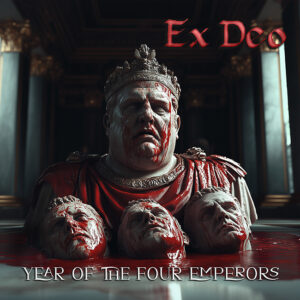 Label: Reigning Phoenix Music
Label: Reigning Phoenix Music
Release date: January 10th, 2025
Everyone who knows Kataklysm, also knows that Italian blood runs through Maurizio Iacono’s veins. With Ex Deo he pays tribute to his heritage since 2008. So far, Ex Deo released “Romulus” (Nuclear Blast, 2009), “Caligvla” (Napalm Records, 2012), “The Immortal Wars” (Napalm Records, 2017) and “The Thirteen Years of Nero” (Napalm Records, 2021). As obvious,”Romulus” is dedicated to the founder and first king of Rome; “Caligvla” to the third Roman Emperor known for his cruelty, sadism, sexual perversions and extravagance; “The Immortal Wars” to the Punic Wars and “The Thirteen Years of Nero” to the fifth Roman Emperor, the best known for burning Rome and persecutions of Christians.
On the EP that will be released on January 10th, 2025, Ex Deo will focus on four emperors: Galba, Otho, Vitellius and Vespasian. Why those four? The history tells, AD 69 was the year of four emperors, the year of the first civil war of the Roman Empire. After Nero just commited suicide stabbing himself in the throat with a dagger because the Senat proclaimed him as an enemy of the state and ordered his execution, the era of the four emperors begun. In short lines, Galba was in Spain when he received the news that he had become an emperor. He ruled only for seven months. On the day of Galba’s murder, Otho became an emperor. His reign lasted for three months. Very ambitious and greedy, but not as cruel as expected to be. After only three months, he commited suicide and Vitellius was recognized as an emperor. He had a lot of problems during his reign which is marked by political instability and military conflicts. After his murder, the Senate acknowledged Vespasian as an emperor, probably, under my opinion, the most successful of those four, who brought stability to Rome and the only one who died of natural causes.
The first song, “Galba”, is the longest song on this EP with its length of 6:16. Dramatic introduction explodes like a bomb shell. Symphonic elements stand out and contribute to the overall atmosphere. The change of tempo as well as the narration parts don’t give the possibility for the listener even to approach the limit of monotony. Long live the revolution!
Chanting intro of “Otho” in oriental style opens the new chapter. Listening to this song, I can not notice that the overall atmosphere (dark and heavy) of the song reminds me a lot of Rotting Christ. Again, at least for my personal taste, narration parts are the highlight of the song and the album. Simply, narration gives the other perspective and depth to the overall experience. If you observe each song as a theater piece, you will understand why I emphasize the narrative parts so much.
“Vitellius” proves that Ex Deo are the masters of intros. So mystique and dramatic, narration emphasises his death and announces Vespasian’s reign. “Vitellius” is the song where Ex Deo will serve the melody that is so typical and recognizable for the band. What is interesting, if you did not notice it while listening to this EP, is that each song doesn’t describe lyrically only the rise of one emperor, but the band announces the next one, so each song is actually introducing the listeners to the plot of the next song.
When it comes to the next, also the last song, “Vespasian”, there is no need to say anything more but to quote:
“The EP’s closing track is an anthem of resilience and renewal. Vespasian emerges as a figure of stability amid the chaos, and the music reflects his calculated strength. Triumphant melodies intertwine with thunderous percussion, capturing his consolidation of power and the restoration of Rome’s fractured empire. The lyrics exalt Vespasian as the harbinger of a new era, culminating in a resounding declaration of victory and legacy. His reign ushers in the Flavian dynasty and a semblance of peace.”
As I wrote, Vespasian, as an emperor, was the most successful of those four, who brought stability to Rome, I can say the same for the song. Under my opinion, the best song on the album, supported by the female operatic vocals, great melody and rhythm and the strongest verses/chorus belong to “Vespasian”:
“Destiny is mine, the sounds of madness, despair and agony for the true voice of Rome
Embellish the shrine, destroy the opposition of fire, Vespasian rise!”
In a few words: conceptual project/band, conceptual albums and now conceptual EP, conceptual and educational lyrics. If metal existed in the Roman Empire, Ex Deo would be highly rated and awarded.
Since the Roman Empire lasted for 503 years, Ex Deo has inexhaustible sources to rule for many years to come. I am looking forward to and eagerly awaiting the next chapter.






